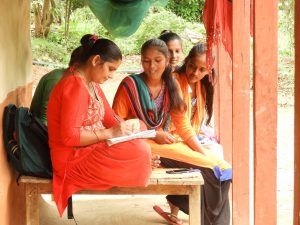This series of blog posts tells the stories of the people affected by chhaupadi, with a view to exploring different aspects of the practice in depth. All testimony and photographs in this series have been made available with the relevant subject’s express consent. A general introduction to chhaupadi is available here and there are more photographs in this album.
16 year-old Laxmi Bik, who has been spending close to a week every month in her family’s chhau goth (menstrual hut) for three years now, is no stranger to superstition. “Being there makes me very afraid and makes me want to stay inside the house,” she says. “I’ve told my parents this many times, but they don’t listen.”
Laxmi Bik tells Dila Kadel of her ordeal.
There is a voice in Laxmi’s house that speaks louder than her own while remaining inaudible. The message it brings is not one of clearly articulated and verifiable facts or reasoned arguments, but rather of fear and trepidation. This voice clearly has her mother and grandmother’s ear. Laxmi had been warned by them many times not to enter the family home while she was menstruating, to avoid causing her entire family punishment.
Laxmi may not believe in the doomsday forecasts of this voice, but she has good reason to fear for their effects. One day, during the middle of her period, Laxmi gathered the courage to show her family once and for all that they would not be punished for failing to banish her from the house. She walked from the chhau goth to the family home and stepped into the kitchen. Her mother turned away from the fire to see who had come inside and, after laying her eyes on Laxmi, looked as if she had just seen a ghost.
Her body, already wound tight at the unexpected sight of her impure daughter, suddenly released its tension in a relentless, full-body tremble, her eyes rolling into the back of her head. “It was as if a god had entered inside her”, Laxmi recalled with a defeated and somewhat fearful tone. Her grandmother, who was also in the room, reacted a little later (perhaps only after seeing Laxmi’s mother), complaining of an acute onset of unbearable pain. Laxmi left the house—the family home to which she belongs—and both grandmother and mother reported to feel much better in her absence.
This video gives an impression of the role that superstition plays in perpetuating the chhaupadi practice. Courtesy of Guardian News & Media Ltd.
This conversation with Laxmi reminded me of part of the lyrics to the famous Stevie Wonder song: “When you believe in things that you don’t understand / Then you suffer / Superstition ain’t the way”. The devastating difference for Laxmi, however, is that she is the greatest victim of a superstition in which only her grandmother and mother believe.
Posted By Caroline Armstrong Hall (Nepal)
Posted Aug 5th, 2018



4 Comments
Corinne Cummings
August 6, 2018
Hi Caroline, I appreciated reading this blog post — Laxmi’s story was disconcerting to read. It’s incredible how superstitions families in rural western Nepal are, especially when it involves their very own family members. Your last paragraph was a perfect end to your blog post — Stevie Wonder speaks the truth. I hope that Laxmi’s mother and grandmother will one day, sometime soon, see the faults in believing in such a superstition that banishes their loved one for something that occurs naturally. I enjoy reading your interviews, Caroline — keep up the good work. Also, thank you for the video! Very helpful. Best, Corinne
Princia Vas
August 6, 2018
This was such an interesting post, Caroline! I am highly impressed by your profiling skills and your ability to get up close and personal with the individuals who are directly and indirectly affected by chhaupadi.
Ali
August 6, 2018
Caroline, thank you for sharing. Laxmi’s story is so sad, and truly shows the negative impact that chauppadi has on families in Nepal. I am looking forward to reading more profiles.
iain
August 12, 2018
Very well written blog about the power of superstition. How exactly can this be confronted and changed?